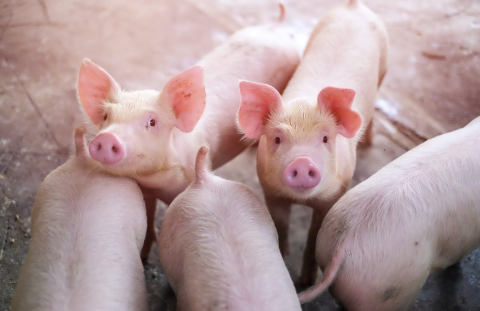- About the Office of Research
- Stategic Research Plan
- Vice-President, Research & Innovation
- Office of Research Units
- Research Centres and Institutes
- Partnership Opportunities
- Student Research Opportunities
- Community Involvement
- Researcher Tools and Resources
- Safeguarding Research
- Commercialization Policy and Framework
- Indigenization, Equity, Diversity and Inclusion in Research
- Research Alerts
- Funding
- Ethics and Regulatory Compliance
- Research Integrity and Conflict of Interest
- Patenting, Licensing, and Commercialization
- Honours and Awards
- Ontario Agri-Food Innovation Alliance
- Other Considerations and Resources
- Forms, Policies, Guidelines, and Procedures
- Interactive Support Sessions for Researchers
- Researcher Training and Development
- Research Administration Information Management System (RAIMS)
Household Food Security Still Uncertain Months After Pandemic

By Alicia Bowland
Months after the start of Canada’s emergency quarantine orders, some Canadian households are still left wondering if they will continue to have access to food at affordable prices in the case of a second wave of COVID-19 cases.
Should another outbreak occur, it will be crucial to monitor a few major factors that are influenced by the pandemic and that are essential to maintaining a stable food supply at affordable prices, says Prof. Brady Deaton, Department of Food, Agriculture and...
What We’ve Learned About Consumer Choice From the COVID-19 Pandemic

A rise in the demand for storable and shelf-stable items was clear during the first wave of the COVID-19 pandemic. So what happens to our consumption of vital perishable goods, such as vegetables and fruit?
By Maleeka Singh
Experts say it's not a question of if we get a second wave of the COVID-19 virus it's a matter of when. So, what lessons have we learned about consumer behavior during the COVID-19 pandemic that can help Canadians and the food industry be more prepared for the next one?
The first thing we've learned, says University of Guelph's Prof. John Cranfield, Associate Dean- External Relations in OAC, and Professor in the Department of Food, Agricultural & Resource Economics, is that consumer purchasing...
Agriculture in Canada Will Remain Resilient Amid COVID-19 Pandemic

By Alicia Bowland
Will current Canadian agricultural government programming be sufficient in the case of a second outbreak of COVID-19?
In these uncertain times, farmers and agribusinesses face unprecedented obstacles that challenge current risk management strategies. Black swan events – rare and unpredictable events, like the COVID-19 pandemic -- are almost impossible to plan for.
Business Risk Management (BRM) programs that are part of the Canadian Agricultural Policy framework -- AgriInvest,...
Using One Health-Informed Strategies to Reduce COVID-19 Impact on Pets, Livestock and Wildlife

SPARK writer Sydney and her dog Riley are following Dr. Weese’s guidelines to limit Riley’s interactions with humans and animals outside of their family bubble.
By Sydney Pearce
World-wide efforts to prevent further deaths from COVID-19 are in full effect, but experts at the University of Guelph say that focusing solely on humans can’t effectively address the pandemic or prevent future ones. They’re responding with rapid research to look at health broadly – including the health of pets – to give governments the tools to improve their strategies.
Here’s why. COVID-19 doesn’t adhere to species boundaries or even affect all humans at an equal level. A One Health approach fills in these blanks by...
Just Peachy – Ontarians Can Look Forward to Earlier, Tastier Peaches

by Dianne Priamo
How about getting the ultimate taste of summer – fresh, mouth-watering Ontario peaches – two weeks earlier than normal, and with even better colour, taste and texture?
That’s what U of G plant breeder Jay Subramanian is aiming for.
As part of the Department of Plant Agriculture, Subramanian is using molecular genetics to pinpoint favourable traits in stone fruits – specifically peach and plum – and incorporate them into superior fruit that meets the desires of producers and consumers.
One of...
Reframing Society’s Views of “Difference”

By Mya Kidson
Eugenics –- that is, race improvement through heredity – has continued to be practiced in Western societies through forced sterilization of Indigenous women and forced assisted suicides for those deemed disabled or “non-vital.” These abhorrent ideas have also surfaced in the wake of the current COVID-19 crisis, through the treatment of seniors and disabled people – those who our society may consider more expendable.
University of Guelph researchers, along with community partners, are doing their part to transform the...
U of G Awards Funding for COVID-19 Research Projects

Photo by CDC on Unsplash
The University of Guelph has awarded nearly $700,000 to U of G researchers for 51 projects designed to support the battle against the COVID-19 pandemic and mitigate its impacts.
The projects, involving faculty, staff and students from all of the University’s colleges, are aimed at reducing the spread of the COVID-19-causing virus SARS-CoV-2, preventing or treating the disease, and navigating the effects of the pandemic on people and communities.
Each project will receive up to $10,000 from the Research Development and Catalyst Fund, with...
Canada’s $4.2-Billion Pork Industry Needs Open Trade

By Dianne Priamo
The economic turmoil brought on by COVID-19 has not spared Canada’s pork industry, a sector that depends significantly on export markets. A U of G professor says open trade and a healthy labour force will be key to the sector’s recovery.
Prof. Ken McEwan warns that there would be huge economic repercussions and food security issues if protectionism or import restrictions were enacted to help the pork sector, which is grappling with a $675-million loss this year according to industry estimates.
...Plan Now to Avoid Panic-Buying Redux When Next COVID-19 Wave Hits, Says Researcher

Photo credit: Pixabay
by Karli Longthorne
The threat of a second wave of COVID-19 infections may amplify food demands and supply shocks if better control and preparedness measures aren’t in place for the food processing sector, says a U of G researcher.
Prof. Getu Hailu, Department of Food, Agricultural and Resource Economics, predicts more challenges ahead if we don’t change some basic approaches to processing.
“The COVID-19 pandemic is not just a public health issue, but a food supply issue,” he says.
The...
Femicide Observatory Works to Better Understand Gender-Related Killings of Women and Girls in Canada

Prof. Myrna Dawson
By Alicia Bowland
Shockingly, a woman or girl succumbs to femicide every three days in Canada. A U of G professor has established the Canadian Femicide Observatory for Justice and Accountability to bring a visible, national focus to this issue and to confront the biases behind it.
As Director of the Observatory, Prof. Myrna Dawson says the first step in reducing femicide is to increase education and awareness of the issue and why it’s important to use the term ‘femicide’. So, she’s created the first such observatory to exist in Canada...
